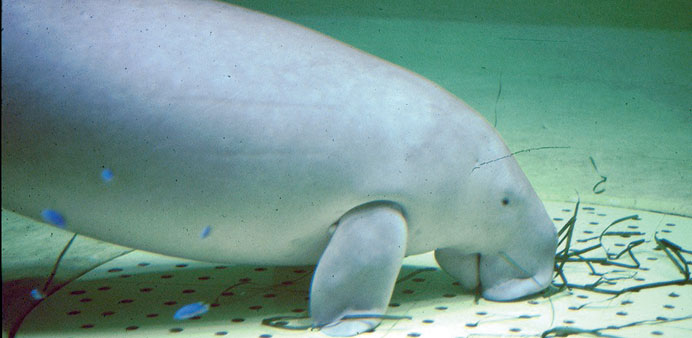|
ExxonMobil Research Qatar (EMRQ), Qatar University (QU) and Texas A&M at Galveston (TAMUG) recently signed a tri-party agreement to further environmental research and marine mammal initiatives relevant to Qatar. |
EMRQ will provide TAMUG and QU with funding and technical assistance in the project to increase understanding of the dugong population in the Qatar coastal waters.
Dugongs are large, long-living herbivorous marine mammals that consume sea grasses, can reach lengths of greater than 3m, weigh more than 400kg and live up to 60 years.
Historically, dugongs have had a cultural and economic importance to Qataris, having been used as both an economic and food resource in the Arabian Gulf for more than 7,500 years.
Qatar is home to the largest population of dugongs outside of Australia with two of the three most important regions in the Arabian Gulf. As long-living, large mammals with a low reproductive output, dugongs are vulnerable to exploitation and are listed as Vulnerable to Extinction by the International Union for the Conservation of Nature.
Currently, dugongs in Qatar face challenges such as incidental fishing and habitat degradation. The extreme marine and physical environment of the Arabian Gulf, as well as the northern limit of dugong distribution, likely means that their life-history differs from populations in Australia.
Limited research has been conducted on Qatari dugongs thus far and this project aims to develop the scientific understanding needed to inform environmental conservation decisions for dugongs in Qatar. The research project is of vital interest to Qatar and meets the strategic research plans of Qatar.
Bart Cahir, president and general manager of ExxonMobil Qatar, said: “By supporting research projects like the dugong study, EMRQ demonstrates ExxonMobil’s commitment to conducting research that will support Qatar’s sustainable development. We are delighted to partner with TAMUG and QU on this valuable marine environment initiative.”
TAMUG, a branch campus of Texas A&M University, is acting as project lead for the programme, with both QU and EMRQ acting as project participants. EMRQ is supporting the project financially as funding entity in addition to providing the technical assistance of staff and researchers.
As initial priorities, the programme will begin by completing the following three research objectives: conducting beach surveys to characterise numbers, sex, size classes and causes of stranded dugongs; determining the age of dugongs by histological processing of tusks collected from stranded animals and integrating age data with stranding data to obtain age-specific population parameters; and interviewing fishermen to locate and estimate dugong numbers in Qatar in preparation for future aerial surveys.
Dr Andrew Wigton, research director of ExxonMobil Research Qatar, said: “We are committed to helping study the dugong population in Qatar so that we can learn more about this iconic species and help conserve its place and function within Qatar’s coastal waters.”
The research team has asked for help from the general public in Qatar. If anyone is aware of any dugong samples or remnants (skulls, tusks, skeletons, etc) or becomes aware of information on dugong strandings, contact Dr Mehsin al-Ansi (co-principal investigator, QU) at 77729996.

